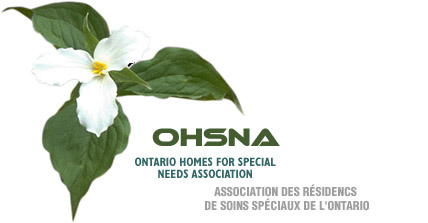The Provincial Budget released this spring announced an increase of 3 per cent a year for three years to be allocated toward unnamed portions of the Community Sector at the Ministry of Health.
Thanks to the OHSNA’s work, the Homes for Special Care program will receive this funding increase at least for the first year. The Housing with Supports Program, however, did not receive an increase.
This leaves residents in one program receiving increased benefits while the same very vulnerable residents in the other program will not receive increased services. Clearly, this is unfair. Rectifying this inequity is OHSNA’s top priority for 2012.
Potential Impact of RHA
The Association remains concerned about the impact of the new Retirement Homes Act (RHA) on “hybrid homes,” or subsidized homes which also provide accommodation to a limited number of private paying residents who are 65 years of age or older.
In June, the RHA became law, and the government released Phase One draft regulations for comment. Under the strong leadership of Sheri Levy-Abraham, the Association held a series of meetings with government officials to make them aware of our concerns if hybrid homes were to be regulated by the RHA. The Association also prepared an official response to this consultation. To view a copy of the response, please click here.
The consultation on Phase One regulations is now closed, and the regulations have been made law. On May 20th draft Phase Two regulations were released for consultation. These regulations deal with matters of insurance, administrative penalties for violations, interim rules for the Emergency fund, and matters of transition.
The government’s current position is that privately paying residents who are 65 years of age or older, who live in domiciliary homes or homes for special care do not have the direct regulatory oversight needed to regulate the care and safety of private pay residents, and thus, these facilities should NOT be exempt from the RHA.
Under the RHA, if a part of the residential complex satisfies the definition of a retirement home, those privately paying beds would be subject to the care and safety requirements of the RHA. The operator of the facility would also be required to obtain a license as a retirement home for those beds.
Areas occupied by private pay residents are not automatically subject to the RHA. The act will only apply to the parts of a residential complex that satisfies the definition of a retirement home. That definition under the act is:
- the relevant part must be occupied primarily by persons who are 65 years of age or older;
- the relevant part must be occupied or intended to be occupied by at least the prescribed number of persons who are not related to the operator of the home (six or more); and,
- the operator of the home must make at least two care services available, directly or indirectly, to the residents of that part.
The OHSNA is disappointed the government has chosen to ignore the concerns it has communicated through our submission and discussions with Ministry officials. The OHSNA wants to be certain the government is aware of the consequences of including these hybrid homes. We are therefore continuing to push this issue, and are requesting the government revisit its decision.
Fire Safety
In the fall the Ministry of Community Safety & Correctional Services announced a consultation on Fire Safety for Vulnerable Residents in Ontario. The consultation was open until March 28th 2011.
Recognizing the importance of this issue to our membership, under the leadership of Connie Evans, the Association developed a response to this consultation. To view a copy of the Association’s submission, please click here.
As a next step we expect the government to release a White Paper summarizing what it heard in the consultation.
Ontario’s New Photo ID Card
Ontario is introducing a new photo identification card that will make it easier for people who do not have a driver’s license to travel, open a bank account, and perform any other activities that require official ID.
The new, secure card will be recognized as government-issued ID for Ontarians 16 and over who do not drive.
Ontarians will be able to apply for the photo card at about 20 selected ServiceOntario centres across the province by the end of July, and at all 300 locations by 2012.
OHSNA participated in early discussions with the government about the development of this ID card, and supports this initiative. To find out more about the Ontario Photo Card please click here.
Municipal Affairs
This winter the provincial government released a new Long-Term Affordable Housing Strategy. Part of that strategy involves consolidating the provincial housing programs to allow municipalities flexibility to address local needs.
To better understand how these changes might affect the Housing with Supports Program, this Spring the Association met with the Assistant Deputy Minister responsible for the program. We learned the work on this policy initiative is in its infancy stage, however, part of the Strategy involves municipalities preparing mandatory ten-year housing and homelessness plans. These local plans would be developed through consultation with the public and the Minister. They would also be consistent with other local plans. Each plan would need to be reviewed and approved by the Minister, and would need to be reviewed at least every five years.
OSHNA has found that some municipalities have already begun developing these plans.
It is extremely important that all Housing with Supports owners actively participate in the development of their local plans. Owners should monitor their local municipalities and watch for this process to begin, and participate in any consultations that are held. You should also notify your Regional Director if you notice the process starting.







